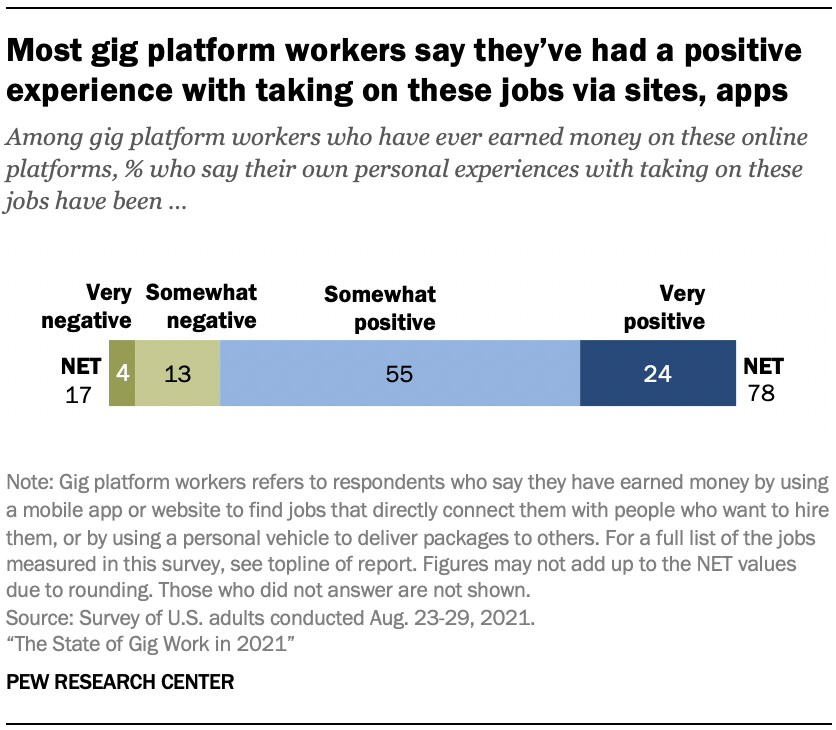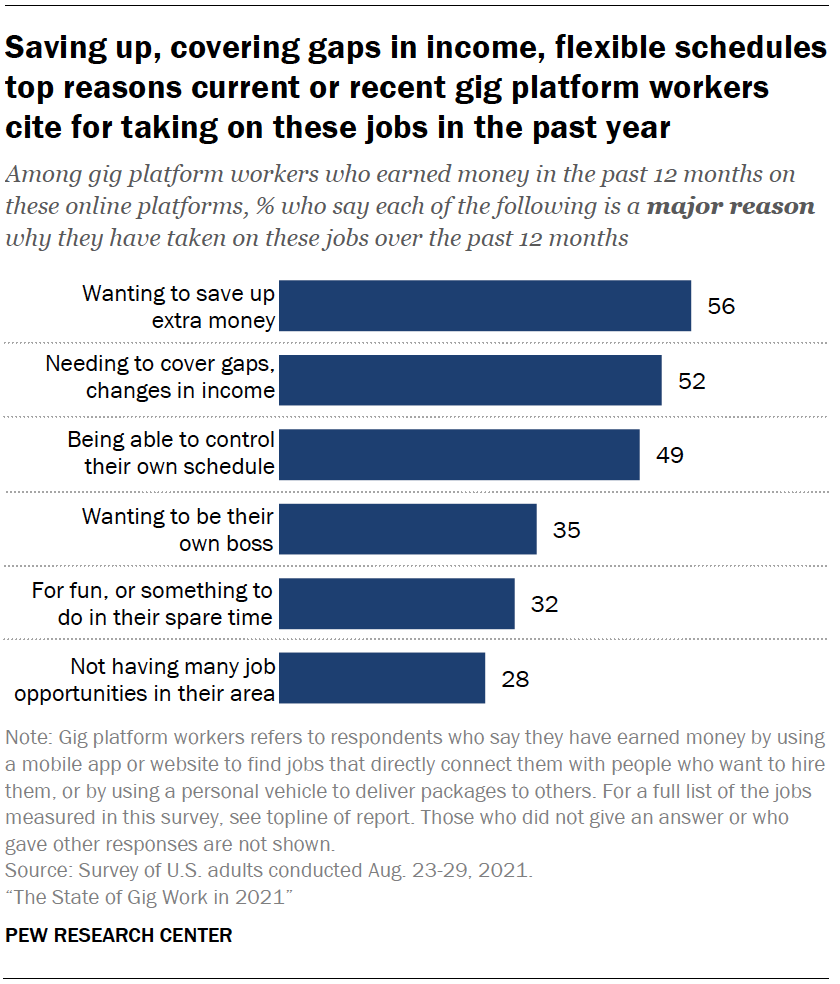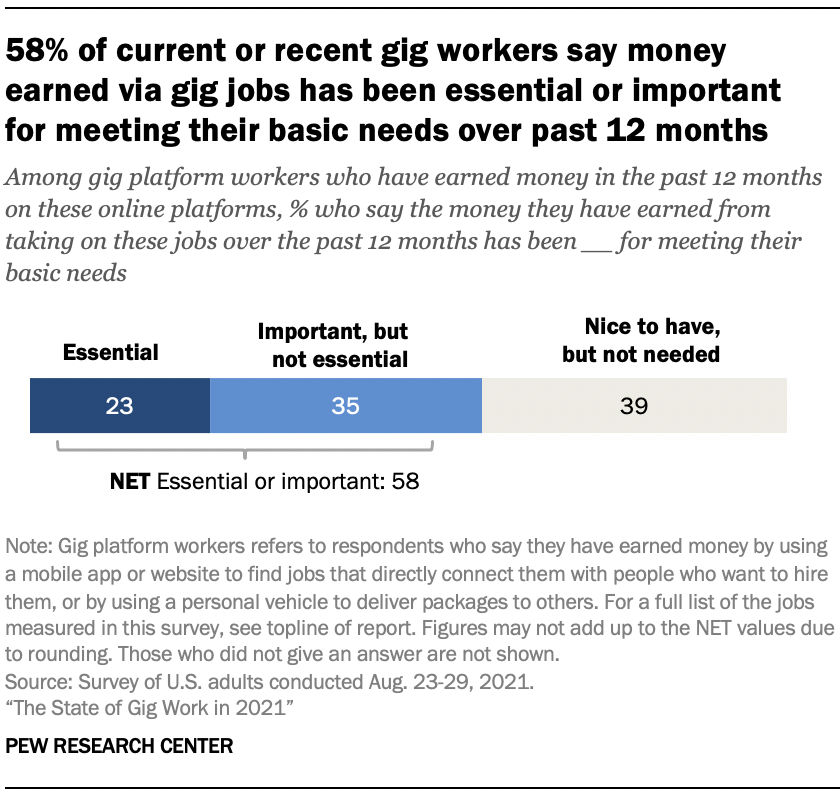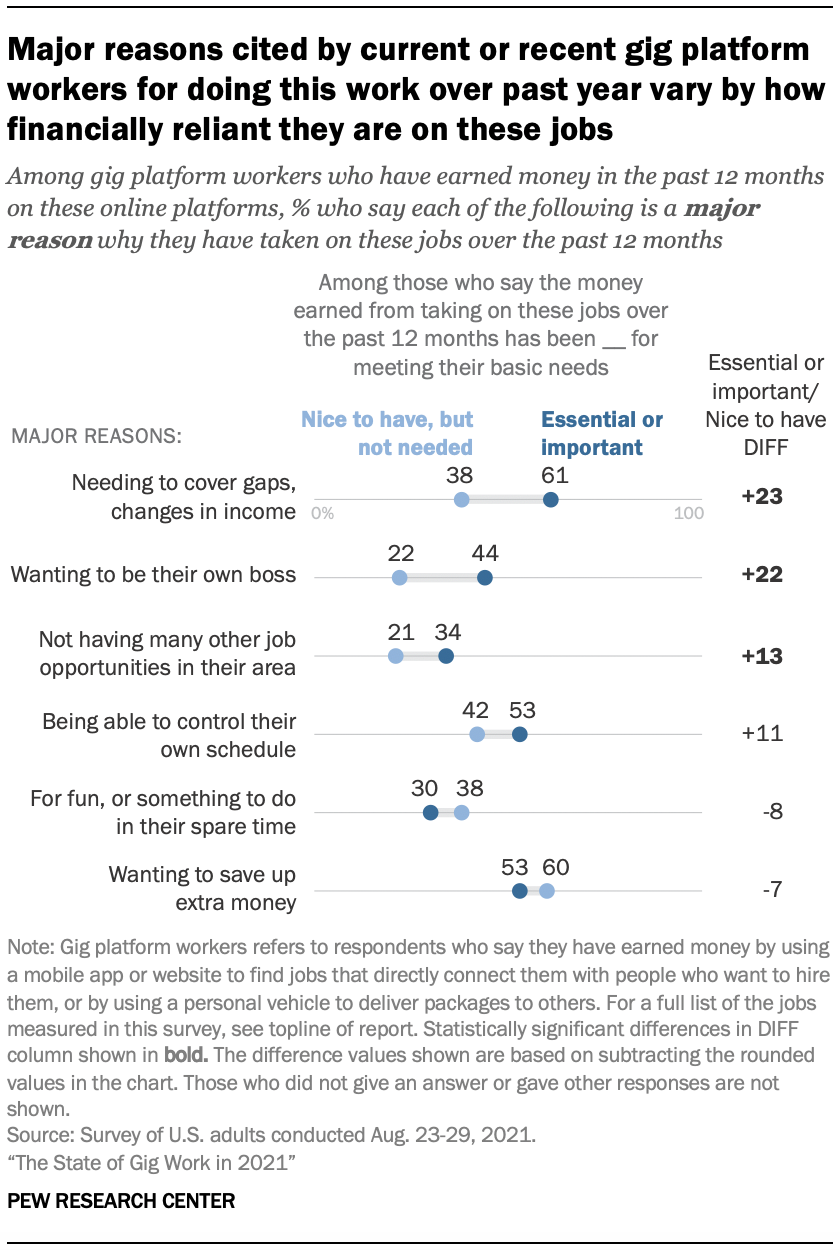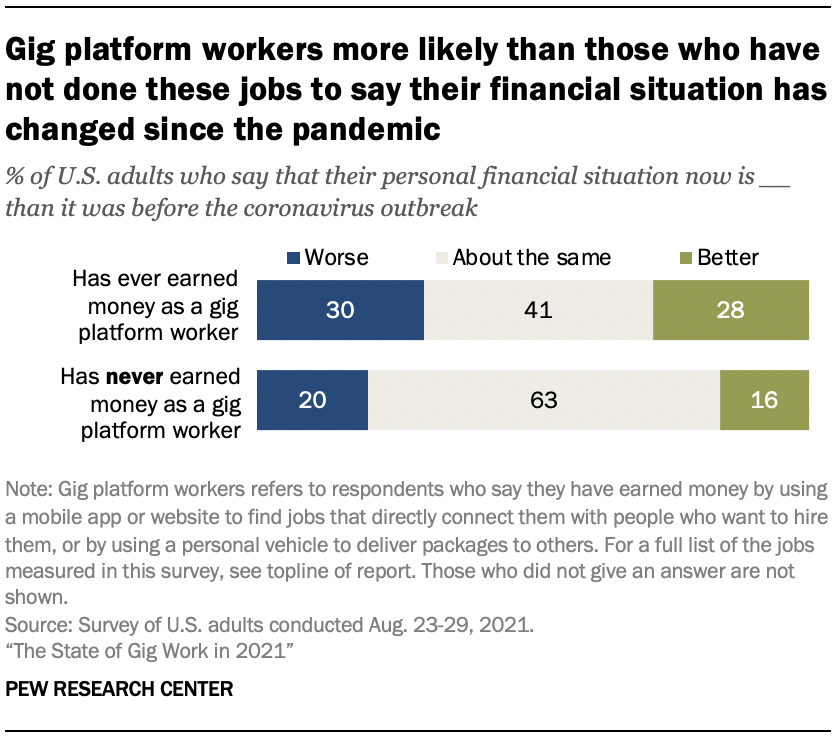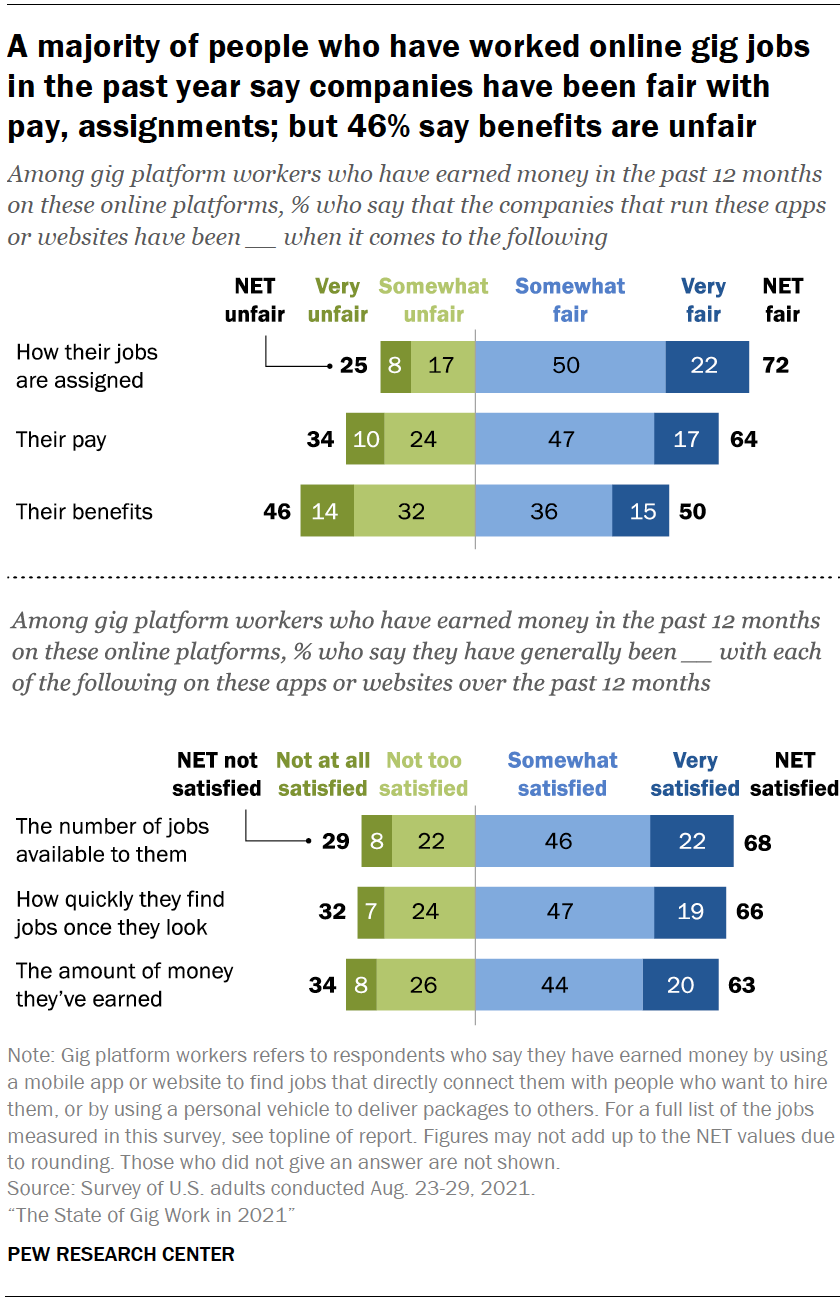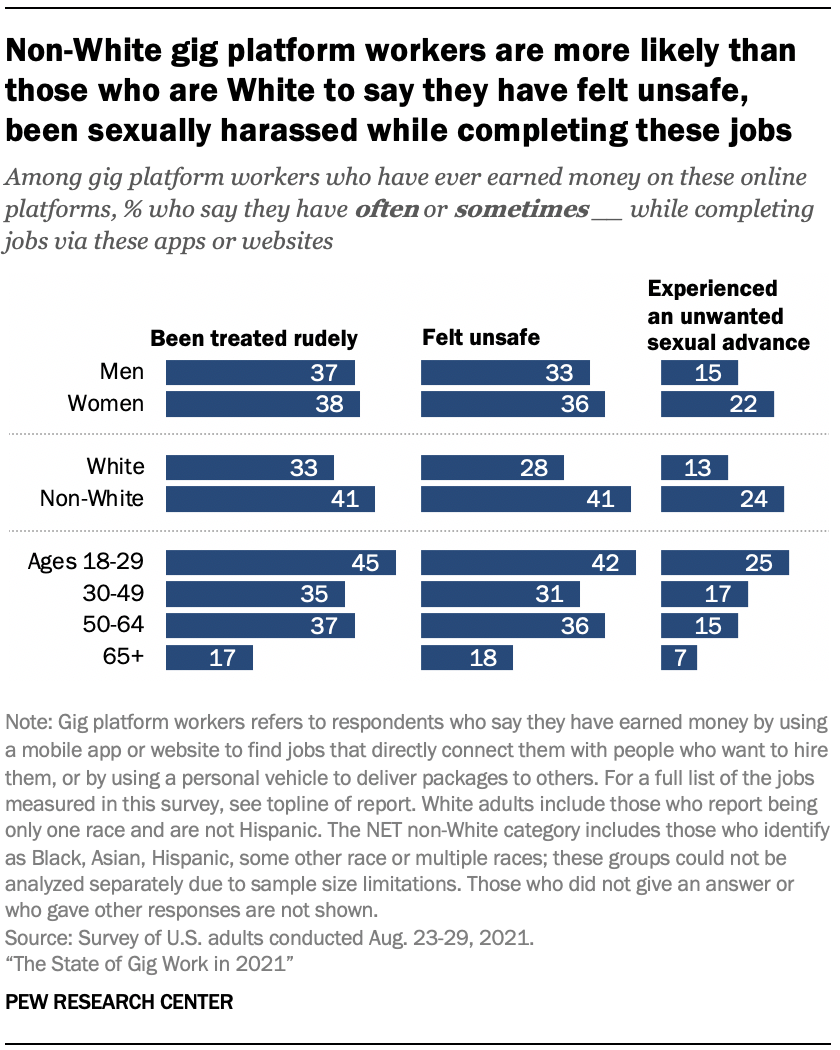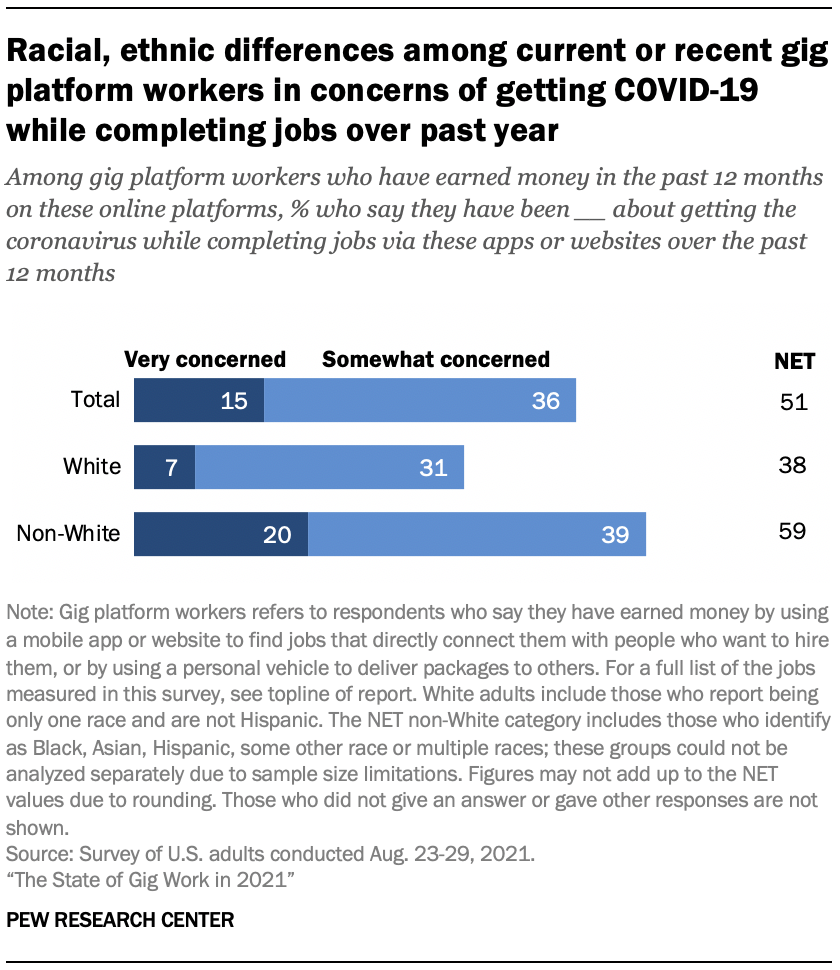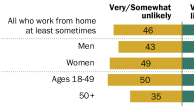There are broad cultural and political debates about the impact of the gig economy – including the positive and negative effects that it may have on workers. But how do gig workers themselves describe their experiences?
This chapter explores the firsthand experiences of gig platform workers and finds that most Americans who have ever earned money this way view it in a positive light. A majority of current or recent gig workers say they have been satisfied with many aspects of the work over the past 12 months, including the number of jobs available to them and the pay.
Still, some also describe a more troubling side of gig work, including negative encounters such as being treated rudely or feeling unsafe. And amid the uncertainty of the pandemic, roughly half of U.S. adults who have taken on gig jobs in the past 12 months say they’ve been concerned about contracting COVID-19 while completing jobs.
This array of experiences also extends to their financial situations. Some say the income they generate from gig jobs is crucial for meeting their basic needs, while others are far less financially reliant on these jobs. And workers who place a high level of importance on the money they earn via gig platforms are especially likely to say they do this work because of gaps or fluctuations in their income.
Roughly eight-in-ten gig platform workers rate their experiences with these jobs positively
Dozens of headlines have spoken to the unique challenges – particularly amid the pandemic – that some gig workers may have encountered, but most people who take on these jobs rate their own experience as positive rather than negative.
Fully 78% of Americans who have ever earned money through these types of platforms say that their own experiences with these jobs have been at least somewhat positive, including 24% who describe it as very positive. A much smaller share (17%) describe their experience in negative terms.
These positive sentiments extend across demographic groups: Clear majorities of gig workers regardless of age, gender, racial and ethnic background or household income report having a good experience with these jobs.
Money, controlling their own schedule top reasons given for taking on online gig jobs in the past year
When the Center asked Americans who have earned money through these platforms in the past year about some of the possible reasons they took on these jobs, financial motivations and flexibility were at the top of the list.
Among current or recent gig workers, about half or more cite wanting to save up extra money (56%), needing to cover gaps or changes in their income (52%) or being able to control their own schedule (49%) as major reasons for taking on these jobs in the past 12 months.
By comparison, 35% say a major reason why they have taken on these jobs in the past year is because they wanted to be their own boss, 32% say they did this for fun or to have something to do in their spare time and 28% report not having many other job opportunities in their area as a key motivation for doing this work.
For a majority of current or recent gig platform workers, the money they earn through these jobs is essential or important for meeting their basic needs
Beyond understanding the motivations for taking on these kinds of jobs, those who have earned money from gig platforms in the past 12 months were also asked how financially reliant they are on these platforms for meeting their basic needs.
Some 58% of Americans who have earned money through online gig platforms in the past year say the money they earned from taking on these jobs over the past 12 months has been essential (23%) or important (35%) for meeting their basic needs. Others are less dependent on these platforms as a key source of income: 39% state that the money they earn is nice to have but is not needed.
The high level of importance that gig workers place on these earnings is especially prevalent among those who are less affluent. Fully 71% of current or recent gig workers who have lower incomes say the money they earn is at least important for meeting their basic needs, compared with 45% of those with middle incomes.8
Those who depend on gig platforms as an income source tend to have different motivations for taking on this work, compared with those who are less financially reliant on the money.
Fully 61% of current or recent gig platform workers who describe the money they earn through these platforms as essential or important for meeting their basic needs say a major reason they have earned money in this way in the past 12 months is because they needed to cover gaps or changes in their income. That compares with 38% who say the money they earn is nice to have, but not needed.
Among gig workers who have done this work in the past year, those who are financially dependent on these platforms are also more likely than those who are not to say they do this type of work because they want to be their own boss (44% vs. 22%) or because they do not have many other job opportunities in their area (34% vs. 21%).
By contrast, there are no statistically significant differences between these two groups when it comes to being motivated to do this work because of flexible scheduling, doing this for fun or saving up extra money.
Those who are more financially reliant on these jobs stand out in other ways. For starters, 38% of current or recent gig workers who say the money they earned through gig jobs in the past 12 months has been essential or important for meeting their basic needs say this type of work has been their main job in the past year, compared with 23% of those who say this money is nice to have but not needed. And those who are more financially dependent on this income are more likely than those who are not to say that in the past year they spent at least 10 hours doing these jobs or tasks in a typical week (46% vs. 24%).
Among gig platform workers, no clear consensus as to the impact the pandemic has had on their personal finances
Despite the coronavirus outbreak triggering a recession, sinking businesses and resulting in millions dropping out of the workforce, a majority of Americans (60%) say their personal financial situation is about the same now as it was before the coronavirus outbreak, and another 18% report it being better. By comparison, 22% of U.S. adults say their financial situation is worse now than before the pandemic.
In some ways, the economic fallout of the COVID-19 pandemic has had a more varied impact on gig workers. Gig workers are more likely than others to report their financial situation has changed during the pandemic – for good and for ill. Three-in-ten gig platform workers say their financial situation now is worse than it was before the coronavirus outbreak, and a similar share (28%) say their finances have actually improved. Still, the largest share (41%) say their financial situation has remained about the same, compared with before the pandemic.
By contrast, those who have no prior experience with earning money through an online gig platform report a more stable economic situation: 63% say their financial situation is about the same now as before the pandemic. Much smaller shares of this group describe their financial situation as either worse (20%) or better (16%) now than before the pandemic.
A majority of gig platform workers who have earned money in the past 12 months say companies have been fair with their assignments, pay; half say the same about benefits
By and large, current or recent gig workers are satisfied with some of the key aspects of their jobs and think companies who run these platforms are fair when it comes to pay and assignments, but there is less consensus when asked about benefits.
A majority of people who have earned money through these platforms in the past 12 months say the companies that run these apps or sites have been very or somewhat fair when it comes to how their jobs are assigned (72%) or their pay (64%).
However, these perceptions about fairness are far more mixed when asked about benefits. Half of recent or current gig workers say that companies have been fair when it comes to their benefits, while a similar share (46%) offers that these firms have been unfair in this regard.
On the other hand, workers are more or less content with many aspects of the jobs they do via these online platforms. About two-thirds of gig workers who have taken on these jobs in the past year say they are at least somewhat satisfied with the number of jobs available to them, how quickly they can find jobs and the amount of money they have earned over this time period.
Fewer than half of gig platform workers say they understand how the companies that run these platforms determine how much they get paid
Overall, 44% of people who have ever earned money through online or delivery platforms say they at least somewhat understand how the companies that run these apps or sites determine how much they get paid, while 52% report understanding this “not too well” or “not at all well.” There are relatively few demographic differences in how these workers describe how well they understand their pay, but age is an exception. Some 26% of these gig workers ages 65 and older say they understand very or somewhat well how the companies that run these platforms have determined how much they get paid, compared with 46% among those adults under the age of 65.
About four-in-ten gig platform workers say they have at least sometimes been treated rudely, while about one-third have felt unsafe while completing jobs
From satisfaction to their overall experience, gig workers generally give these types of jobs high marks. Still some users describe a far less desirable side of gig work – one that includes rudeness, threats to their safety and sexual harassment.
Some 37% of Americans who have ever earned money through gig platforms say they have often or sometimes been treated rudely while completing jobs via these apps or sites, while a similar share (35%) says they have at least sometimes felt unsafe while on the job. Other negative encounters are more sexual in nature: 19% of gig workers say they have at least sometimes experienced an unwanted sexual advance when doing this kind of work.
These negative encounters are more prevalent among certain groups than others. For example, adults under the age of 65 who have ever earned money on gig platforms are far more likely than those 65 and older to report often or sometimes being treated rudely, feeling unsafe or experiencing an unwanted sexual advance while completing jobs through apps.
Experiences also vary by race and ethnicity, as non-White gig platform workers are more likely than their White counterparts to say they have at least sometimes felt unsafe (41% vs. 28%) or experienced an unwanted sexual advance (24% vs. 13%) while completing jobs.
Additionally, women who have ever earned money through these platforms are more likely than men to say they have often or sometimes been the target of an unwanted sexual experience while completing jobs through these platforms (22% vs. 15%). By contrast, similar shares of gig-working men and women report being treated rudely or feeling unsafe.
About half of current or recent gig platform workers say they have been concerned about getting coronavirus while completing jobs over the past year
The pandemic upended several aspects of everyday life, including activities like in-person shopping or dining out. In fact, many Americans reported feeling uncomfortable with eating out or going to the grocery store in surveys conducted by the Center in March and June 2020.
While gig workers’ interactions with the general public vary by the type of the work they do, the nature of some of the tasks – driving people around in their vehicle or shopping inside of a store – do put some of these workers in close quarters with others.
At the time this survey was fielded in August 2021, 51% of Americans who had earned money through gig platforms in the past year reported being very or somewhat concerned about getting the coronavirus while completing jobs over the past 12 months. A similar share (47%) said they were not too or not at all concerned about catching the virus during this time.
As is true within the general population, concerns about contracting COVID-19 vary by race and ethnicity. While 38% of current or recent White gig workers say they have been at least somewhat concerned over the past year about getting the coronavirus while working these jobs, that share rises to 59% among those who are non-White.
